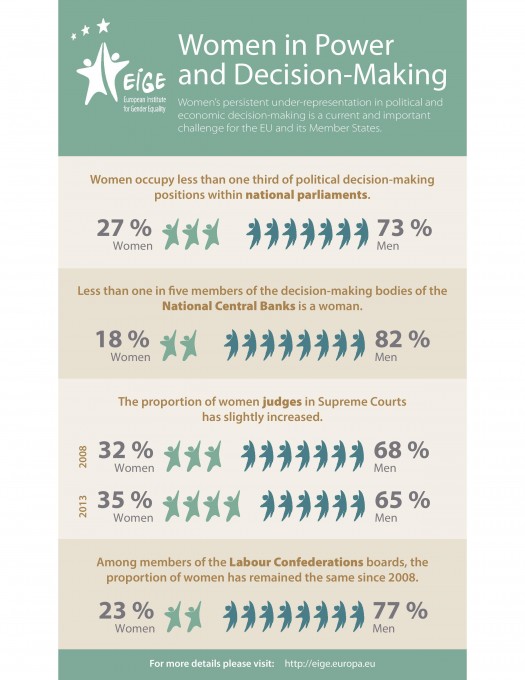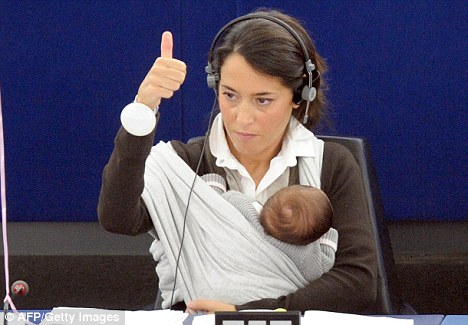European politics of gender equality: the mountain that gave birth to a mouse?
On paper, gender equality is high on the current EU agenda. In his 10 ‘Commandments’, President Juncker has committed to a more gender-balanced Commission; the European Parliament has maintained continued pressure on other institutions to present and adopt regulatory measures; and, just last week, Commissioner Jourova pledged to present a comprehensive legislative package on gender equality in 2016.
This focus on gender equality shouldn’t come as a surprise; women can be the edge Europe needs to stay ahead in a competitive global setting.
There is a clear business case for more gender equality in the EU, with numerous studies showing the economic benefits for businesses in fostering diversity in senior positions – investors also care more and more about companies’ corporate and social responsibility performance. In addition, to keep its position as a global agenda-setter, the EU can only benefit from adapting to social changes and acknowledging the powerful voice of a growing number of female thought leaders. After all, we’re in the age of Malala, Commissioner Margrethe Vestager, Taylor Swift and Facebook’s Sheryl Sandberg.
However, recently the EU seems to have a limited impact when it comes to pushing gender equality forward, and progress has been stalling in the last ten years:
- Gender-related law passed in the last two Council Presidencies is almost non-existent, and some measures such as the Maternity Leave Directive have been withdrawn, while ongoing files like the Women on Boards Directive are stalled, and adopted measures such as recommendations on gender mainstreaming face implementation issues.
- Statistics paint a bleak picture: persisting pay (16.4%) and pension (39%) gaps[1], continued gender imbalance in decision-making (see graph below), and prevalence of gender-based violence.
- Progress amongst Member States is uneven, and at the current pace equal pay will have to wait 70 years (that’s something to make former Justice Commissioner Viviane Reding furious!)
Will Commissioner Jourova’s upcoming legislative package bring some new energy to the gender equality project? Despite the EU’s ability to set political agendas, legislating gender equality faces many obstacles within the institutions, while cultural and subsidiarity issues can delay progress in Member States. Overall, it seems that what’s needed for concrete progress is a comprehensive push where the EU, Member States and the industry alike focus on what they do best, be it agenda-setting or legislating, to strive for a more equal Europe.
Institutional hurdles at EU-level
Within the EU institutions, it seems that gender as a policy issue is not currently being prioritised. While gender equality is a third of Commissioner Jourova’s mandate, only 8 policy officers in one dedicated Unit are currently focusing on gender equality in the Commission. In the European Parliament, the formal impact of the gender equality Committee seems equally limited – despite continuous work to pressure other institutions to adopt legislative measures, most recent projects have been dedicated to progress reports or non-binding resolutions. Finally, there’s no Council formation dedicated to gender equality.
As for the role of dynamics between institutions, they often stall the legislation that manages to make its way through to negotiations. The Maternity Leave Directive proposal, which seeked to extend the minimum leave period from 14 to 18 weeks, was recently withdrawn by the Commission due to being blocked in the Council and despite the efforts of the Parliament – the same situation that stalls the Women on Boards proposal aiming to improve gender balance in corporate governance; showing the difficulties of transitioning such proposals from a more ambitious Parliament to a more conservative Council.
Member States’ role: How important is the subsidiarity issue?
Several Member State-level issues keep gender equality from progressing faster. Gender at a national level is increasingly bundled with other discrimination issues in administration and is often justified solely through economic goals such as labour efficiency, rather than claimed as an objective in itself. Public servants working on gender mainstreaming within other policy issues are often too strained working across multiple files to make a difference, while the EU-recommended gender impact assessments are almost non-existent – the soft nature of most recent EU law on gender issues makes for weak regulatory pressure on Member States.
On a more political level, some Member States have shown not to appreciate being told how to manage gender relations – due partly to the politically sensitive nature of the subsidiarity debate. Indeed, although most Member States proactively recognise the importance of gender equality, the issue is so embedded in national culture that trying to introduce EU law on the topic can lead them to adopt a defensive position – partly explaining Germany’s stalling of the Women on Boards Directive in Council, despite recently passing legislation at national level to improve gender quotas on company boards. This is coupled with a resurgence of ultra-conservative parties associated with traditional gender roles preferences in several Member States – while Sweden maintains the only self-proclaimed feminist government and diplomacy in the EU.
The future of gender equality: Much more than economic performance
Commissioner Jourova’s forthcoming proposals could bring a comprehensive policy package to the table – but they’re unlikely to succeed in bringing genuine gender equality to the EU without a much stronger and committed support from the EU, Member States and the industry.
In addition, depending on the content of the policy package, and in reaction to Commissioner Jourova’s statement that it will mostly focus on ‘economic prosperity, not social change’[2], perhaps it is necessary to acknowledge that long lasting change will only be achieved when gender equality is decoupled from economic performance and progresses at all levels of societal activity: while women are a formidable workforce that is currently underutilised, gender equality goes far beyond labour efficiency, which is just a tree in the forest of women’s rights.
[1] Statistics sourced from the Report of the European Parliament’s Committee on Women’s Rights and Gender Equality adopted on 13 May 15, on the EU Strategy for equality between women and men post 2015.
[2] Heath, R. ‘Maternity leave’s pregnant pause’ in Politico, 4th August 2015 (online edition) – article available here : http://www.politico.eu/article/europe-bailout-women-jourova-employment-equality/
10 Comments
Find Out More
-
Are you fit for 2024? Communicating in a year of change
February 27, 2024






August 14, 2015 | 6:20 PM
European politics of gender equality: the mountain that gave birth to a mouse? https://t.co/08EOnhoO2q
August 14, 2015 | 11:44 AM
European politics of gender equality: the mountain that gave birth to a mouse? https://t.co/xVcgCoqIyk
August 13, 2015 | 4:23 PM
RT @LucieInBrussels: @ucdpolitics Check out my piece on EU #genderequality politics, produced during my #Erasmus placement at @fleishmanEU …
August 13, 2015 | 2:35 PM
A look at the gender equality issue in the EU & the trouble with legislating on it, by my @FleishmanEurope colleague http://t.co/UhSyxJZVX4
August 13, 2015 | 1:44 PM
@JunckerEU @VeraJourova :European #Gender #equality : the mountain that gave birth to a mouse? http://t.co/7atCmeEPni http://t.co/jBN7Y5YqSv
August 13, 2015 | 1:41 PM
RT @fleishmanEU: New on the blog: EU gender equality politics: the mountain that gave birth to a mouse? http://t.co/3LMgR3B4z9 http://t.co/…
August 13, 2015 | 11:51 AM
@ucdpolitics Check out my piece on EU #genderequality politics, produced during my #Erasmus placement at @fleishmanEU http://t.co/vJKkOs6MEr
August 13, 2015 | 11:50 AM
#European politics of gender equality: the mountain that gave birth to a mouse? http://t.co/nKVJqqKYd0 #genderequality #juncker @fleishmanEU
August 13, 2015 | 11:38 AM
RT @fleishmanEU: New on the blog: EU gender equality politics: the mountain that gave birth to a mouse? http://t.co/3LMgR3B4z9 http://t.co/…
August 13, 2015 | 11:33 AM
New on the blog: EU gender equality politics: the mountain that gave birth to a mouse? http://t.co/3LMgR3B4z9 http://t.co/xTOYffjg2J